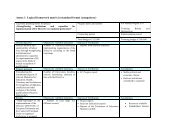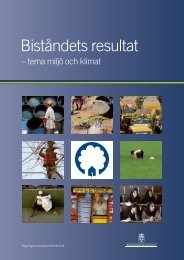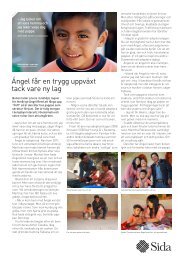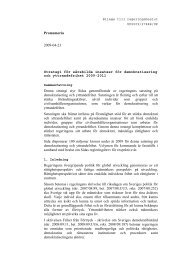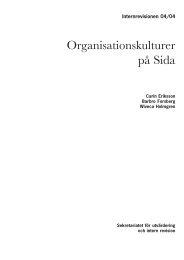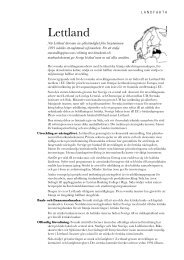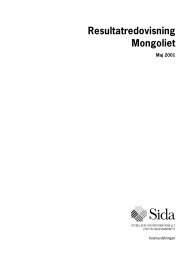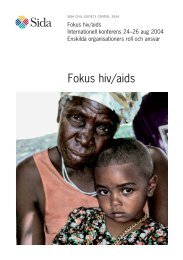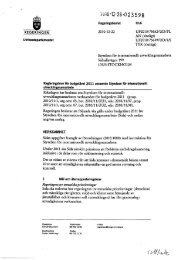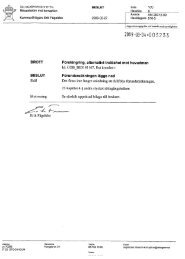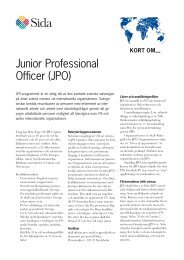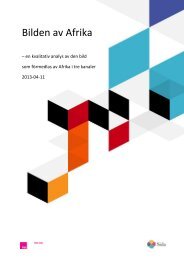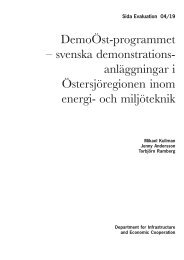Mid-Term Review of the AGIR Programme - Sida
Mid-Term Review of the AGIR Programme - Sida
Mid-Term Review of the AGIR Programme - Sida
Create successful ePaper yourself
Turn your PDF publications into a flip-book with our unique Google optimized e-Paper software.
2 F I N D I N G S<br />
jor reason for this has been <strong>the</strong>ir ability to be less concerned about, and dependent on,<br />
consulting or project-based implementation work to cover operational costs. Additionally,<br />
<strong>the</strong> role <strong>of</strong> <strong>the</strong> intermediaries and <strong>the</strong>ir lobbying for more coordination<br />
among donors with regard to funding is also seen as a positive contribution by <strong>the</strong><br />
partners. As an example, <strong>the</strong> results achieved with Forum Mulher and N’Weti in <strong>the</strong><br />
adoption <strong>of</strong> common funds is a well-received result <strong>of</strong> good donorship promotion.<br />
In <strong>the</strong> 2012 mid-term report, it is noted that intermediaries are increasingly involved<br />
in common funding negotiations. IBIS has agreed to a common funding arrangement<br />
with MASC and a MoU has been agreed to with IESE (Institute for Economic and<br />
Social Studies). Oxfam and MASC are negotiating concerning a common partner,<br />
Estamos, while Dikonia is mobilising support for <strong>the</strong> Electoral Observatory. The increased<br />
need for harmonisation <strong>of</strong> reporting and financial procedures, given <strong>the</strong> nature<br />
<strong>of</strong> good-donorship practices, and core-funding mechanisms are considered appropriate<br />
by <strong>the</strong> partners, apart from some complaints about late financial disbursements<br />
due to delayed reporting. In o<strong>the</strong>rs instances <strong>AGIR</strong> has been a key force in<br />
supporting CSOs to lobby for o<strong>the</strong>rs to join common pool funding mechanisms.<br />
However, <strong>the</strong> dramatic reduction <strong>of</strong> funding and change in some donors’ strategic<br />
priorities, as regards support to civil society, is generally reducing <strong>the</strong> availability <strong>of</strong><br />
sources <strong>of</strong> funding.<br />
There are also, however, problems with <strong>the</strong> outward flow <strong>of</strong> resources to <strong>the</strong> provinces<br />
from <strong>the</strong> central or national organisations levels. At <strong>the</strong> local level funding is <strong>of</strong>ten<br />
scarce, with organisations having a relatively minor share <strong>of</strong> <strong>the</strong> funding considering<br />
<strong>the</strong> number <strong>of</strong> activities within <strong>the</strong> CSO strategic plans that fall under <strong>the</strong>ir responsibilities.<br />
Considerable weaknesses remain at <strong>the</strong> local level where less funds, less capacity<br />
and less visibility <strong>of</strong> <strong>the</strong> programme persist.<br />
At <strong>the</strong> level <strong>of</strong> <strong>the</strong> intermediaries, <strong>the</strong> principle <strong>of</strong> good-donorship has stimulated<br />
<strong>the</strong>m to set up structures for joint work – for example, <strong>the</strong> Intermediaries Coordination<br />
Committee and its associated technical unit(s) – bringing a degree <strong>of</strong> harmonisation<br />
<strong>of</strong> procedures, <strong>the</strong> organisation <strong>of</strong> joint training activities, as well as <strong>the</strong> sharing<br />
<strong>of</strong> training material. However promoting good donorship has also had its challenges<br />
for <strong>the</strong> intermediaries. For example, in <strong>the</strong> 2010 report, Oxfam Novib mentions <strong>the</strong><br />
challenges <strong>of</strong> embarking on a dialogue with partners without imposing activities -<br />
even those in great need <strong>of</strong> capacity development. In this regard, <strong>the</strong> programme has<br />
had to learn how to provide capacity development <strong>of</strong> CSOs without imposing models.<br />
Capacity development in administration, finance, management and planning, fundraising<br />
has been an important element in streng<strong>the</strong>ning organisations’ capacities to be<br />
able to mobilise and manage funds. There has been a general need for capacity<br />
streng<strong>the</strong>ning to reduce fiduciary risks. Currently, <strong>the</strong>re are 43 active <strong>AGIR</strong> partners.<br />
Since <strong>the</strong> start <strong>of</strong> <strong>the</strong> programme, three core-funded partner contracts have been cancelled/suspended<br />
by Diakonia - (MEPT – Education for All Movement)), Oxfam<br />
(MONASO – Mozambican Network on HIV/AIDS) and IBIS (MISA-Media Institute<br />
35



